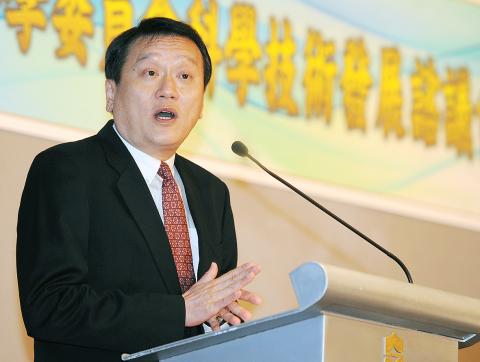The National Science Council initiated a conference yesterday in which scientific advisers to the council will discuss a growing brain drain crisis that is threatening Taiwan’s economic and technological development.
National Science Council Minister Cyrus Chu (朱敬一) said participants at the council’s two-day conference on developing science and technology will brainstorm on stopping the brain drain and also on how to better link academic research with the private sector.
Part of the problem, Chu said, is that many of the foreigners working in Taiwan are not highly skilled.

Photo: Liao Chen-huei, Taipei Times
Of the 450,000 foreign nationals who came to Taiwan to work last year, 400,000 were hired as blue-collar workers.
Most of the remaining white-collar workers were language teachers or involved in jobs that did not require technical skills or specialized knowledge, he said.
The conservative nature of Taiwanese society has also held up efforts to attract foreign professionals to work in Taiwan, he added, noting that few foreigners serve in decisionmaking positions in local companies.
At the same time, China’s aggressive efforts to recruit Taiwanese talent by offering high salaries is eroding Taiwan’s homegrown talent pool, Chu said.
On the eve of the conference, Chu raised the alarm over the brain drain, warning that Taiwan would “perish miserably” if it continued doing nothing to stop the country’s erosion of talent, according to local media reports.
The official said Taiwan has entered a “talent-gap era,” with fewer Taiwanese students going abroad for advanced studies and increasing difficulties in keeping talent at home or attracting top professionals from abroad, the Chinese-language United Daily News reported.
The Industrial Technology Research Institute, Taiwan’s top technology research agency, has already lost several senior executives to similar research organizations in China because it was unable to match China’s lucrative salary and benefits offers, Chu said.
To stop the drain, the minister said Taiwan should define “talent” and “workers” separately, and he suggested that caps on senior officials’ salaries at national research institutes should be lifted.
The government would use the conclusions from the conference as a reference when devising science and technology development strategies, the council said.

Global bodies should stop excluding Taiwan for political reasons, President William Lai (賴清德) told Pope Francis in a letter, adding that he agrees war has no winners. The Vatican is one of only 12 countries to retain formal diplomatic ties with Taiwan, and Taipei has watched with concern efforts by Beijing and the Holy See to improve ties. In October, the Vatican and China extended an accord on the appointment of Catholic bishops in China for four years, pointing to a new level of trust between the two parties. Lai, writing to the pope in response to the pontiff’s message on Jan. 1’s

A Vietnamese migrant worker on Thursday won the NT$12 million (US$383,590) jackpot on a scratch-off lottery ticket she bought from a lottery shop in Changhua County’s Puyan Township (埔鹽), Taiwan Lottery Co said yesterday. The lottery winner, who is in her 30s and married, said she would continue to work in Taiwan and send her winnings to her family in Vietnam to improve their life. More Taiwanese and migrant workers have flocked to the lottery shop on Sec 2 of Jhangshuei Road (彰水路) to share in the luck. The shop owner, surnamed Chen (陳), said that his shop has been open for just

HOLIDAY EXERCISE: National forest recreation areas from north to south offer travelers a wide choice of sights to connect with nature and enjoy its benefits Hiking is a good way to improve one’s health, the Forestry and Nature Conservation Agency said, as it released a list of national forest recreation areas that travelers can visit during the Lunar New Year holiday. Taking a green shower of phytoncides in the woods could boost one’s immunity system and metabolism, agency Director-General Lin Hwa-ching (林華慶) cited a Japanese study as saying. For people visiting northern Taiwan, Lin recommended the Dongyanshan National Forest Recreation Area in Taoyuan’s Fusing District (復興). Once an important plantation in the north, Dongyanshan (東眼山) has a number of historic monuments, he said. The area is broadly covered by

TAKE BREAKS: A woman developed cystitis by refusing to get up to use the bathroom while playing mahjong for fear of disturbing her winning streak, a doctor said People should stand up and move around often while traveling or playing mahjong during the Lunar New Year holiday, as prolonged sitting can lead to cystitis or hemorrhoids, doctors said. Yuan’s General Hospital urologist Lee Tsung-hsi (李宗熹) said that he treated a 63-year-old woman surnamed Chao (趙) who had been sitting motionless and holding off going to the bathroom, increasing her risk of bladder infection. Chao would drink beverages and not urinate for several hours while playing mahjong with friends and family, especially when she was on a winning streak, afraid that using the bathroom would ruin her luck, he said. She had